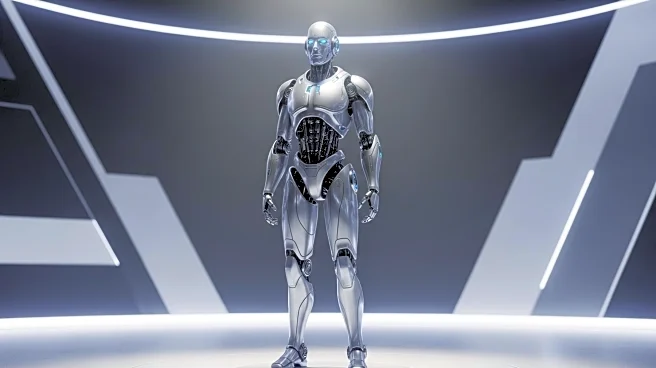What is the story about?
What's Happening?
The inaugural World Humanoid Robot Games took place in China last weekend, showcasing the capabilities of humanoid robots in various competitive events. Unitree, an autonomous robot, emerged as a standout performer, winning four events, including the 100-meter dash. The victory in the dash was aided by a handicap rule that provided a coefficient advantage to autonomous robots. Another notable winner was Galbot, which excelled in the warehouse sorting challenge. The event underscored the importance of humanoid robots being adept at multiple tasks, such as manipulation, coordination, and obstacle avoidance. RealMan also announced the launch of a robotics data training center in Beijing, further emphasizing the growing interest and investment in robotics technology.
Why It's Important?
The success of Unitree and other robots at the World Humanoid Robot Games highlights the rapid advancements in robotics technology and its potential impact on various industries. As humanoid robots become more capable, they could revolutionize sectors such as logistics, manufacturing, and service industries by performing tasks that require precision and adaptability. The event also reflects the increasing global competition in robotics, with companies investing heavily in research and development to gain a competitive edge. This could lead to significant economic benefits, including job creation in tech sectors and improved efficiency in operations. However, it also raises questions about the future of human labor and the ethical implications of widespread automation.
What's Next?
The World Humanoid Robot Games are expected to continue in future years, with organizers planning to refine the rules and expand the scope of the competition. This could lead to more sophisticated challenges that test the limits of humanoid robots' capabilities. Companies like Boston Dynamics and FieldAI are likely to continue their research and development efforts, focusing on creating AI generalist robots that can perform a wide range of tasks. The establishment of the robotics data training center in Beijing suggests a growing emphasis on education and skill development in the field, which could foster innovation and collaboration among global robotics experts.
Beyond the Headlines
The event not only showcases technological advancements but also highlights cultural and ethical dimensions. As humanoid robots become more integrated into daily life, societies will need to address issues such as privacy, security, and the potential displacement of human workers. The competition also serves as a platform for international collaboration, with companies and researchers from different countries coming together to push the boundaries of robotics. This could lead to a more interconnected global community, where technology serves as a bridge between diverse cultures and economies.
















